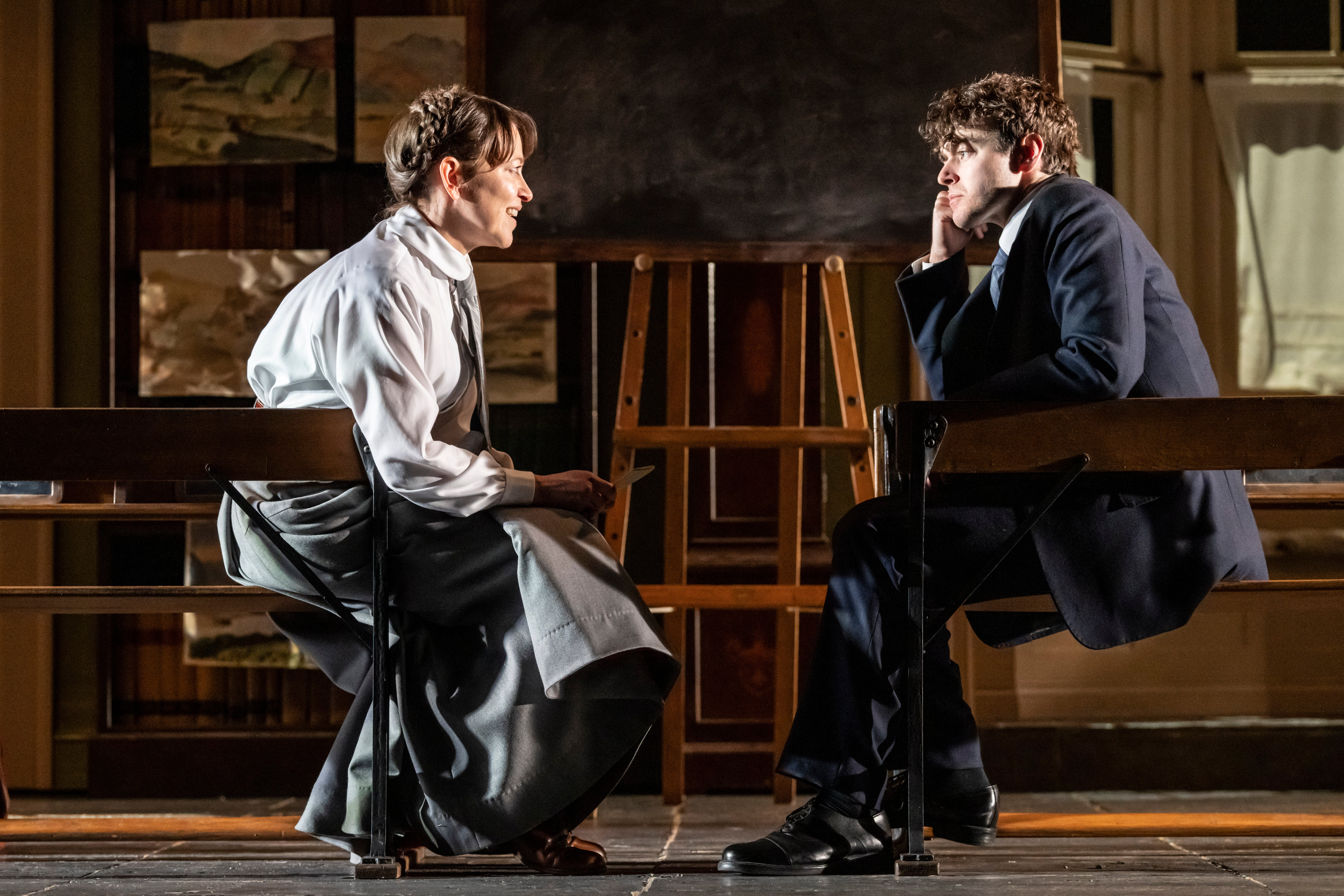The Week on Stage, from The Corn is Green to Jerusalem
The highs and lows of the week’s theatre

This week’s theatre round-up features the return of Jez Butterworth’s Jerusalem, The Corn is Green at the National and Jodie Comer’s West End debut.
Check back next week for another cohort of productions, including Oklahoma!, The End of the Night and Middle.
Jerusalem – Apollo Theatre ★★★★☆
Jez Butterworth’s hit 2009 play Jerusalem takes a small, grubby woodland clearing and fills it with a distinctly English kind of magic. Not the twee, spangled kind of faeries and spells. Something rougher and darker, and as gnarled and twisted as an old elm tree. In this revival, arriving more than a decade since the play first premiered, all the old magic is intact and potent as ever.
Its original star Mark Rylance is still in place, and his much-acclaimed central performance as rustic antihero Johnny “Rooster” Byron is still very much a thing to marvel at. Byron lifts himself and the teenage misfits who flock to his caravan out of the grime of their immediate surroundings by crafting tall tales that mix fiction and fact, myth and the mundane.
There’s a real cruelty to Jerusalem’s vision of Englishness, whether it’s the petty council men who relish the chance to evict Byron, or the young people who make fun of him when his back is turned. It is, though, an exercise in myth-making, one that’s equally in love with the legends of Old England and modern tales of drunken derring-do. Perhaps it overly romanticises its drug-peddling hero, but with Rylance in the role, its spell is irresistible. Alice Saville
Read the full review here.

The Corn is Green – National Theatre ★★★★☆
On paper, modern audiences should find The Corn is Green unbearable. The story of an unmarried English “spinster” Miss Moffat (Nicola Walker) who moves to a Welsh mining town to educate its “barbarian” inhabitants by teaching them English sounds saccharine – if not offensive. But 84 years after it was written, life has been re-instilled into Dominic Cooke’s version of Emyln Williams’s autobiographical-ish tale.
It may sound like an outdated saviour parable, but even with its period dressings, this version feels sparky and, dare I say it, fresh. It’s largely due to the transposing of Williams’s text into a memory play, where the playwright himself (Gareth David-Lloyd) is an omnipotent on-stage director, dictating stage directions unheard by the other characters.

The more ridiculous lines are played heavily for laughs, their speakers – the Squire (Rufus Wright) and Miss Bronberry (Alice Orr Ewing) – plummy-toned. When she hears people in Wales speaking the Welsh language (heaven forbid!), she scoffs: “Do you know, it’s as bad as being abroad,” wringing the line of all its comic potential.
Walker is one of Britain’s finest actors, meaning any performance comes with high expectations. She more than lives up to them. Striding across the stage, she brusquely dishes out zingers, unbothered if they cause offence. There are, however, moments when her positioning as a selfless champion of the underrepresented is at odds with the script. While she may mock the Squire for seeing star student Morgan Evans (Iwan Davies) as a “race horse”, she herself calls him “my little pit pony”.
Around Walker, a delectable world is built. The townspeople are an ever-present singing Greek chorus, their voices harmonising first in Welsh, then English. As their language transforms, so does Ultz’s stage from bare bones to an intricate, traditional set. It’s not a change that’s ever particularly explained, but it’s simpler to enjoy the spectacle. Isobel Lewis
Prima Facie – Harold Pinter Theatre ★★★★☆
It’s hard to believe that Prima Facie marks Jodie Comer’s West End debut, given the command the Killing Eve star has over her audience from the moment she strides onstage. She plays Tessa, a defence barrister who specialises in defending accused rapists. Her life, ethics, and belief in the system that she’s spent her entire career upholding comes crashing down when a fellow lawyer rapes her.
When Tessa decides to take her rapist to court and becomes the witness, Comer is alternately steely and impassioned, noble and embarrassed, flustered and composed. It’s a remarkably agile performance, and helps paper over the weaker moments in playwright Suzie Miller’s text.

The argument the play gestures towards is that the legal system we have in place is entirely broken; that so-called “legal truths” are unable to hold the complexities and inherent incoherence of actual fact. Whether it drills down enough into this idea is another matter. It often hankers for tidiness in a way that undercuts its thematic aims: the music is somewhat overwrought, and Tessa’s rousing speech at the play’s close feels far too Hollywood in its neatness. Comer’s performance is extraordinary, though, and Prima Facie is worth seeing for that alone. Ava Wong Davies
Read the full review here.






Join our commenting forum
Join thought-provoking conversations, follow other Independent readers and see their replies
0Comments